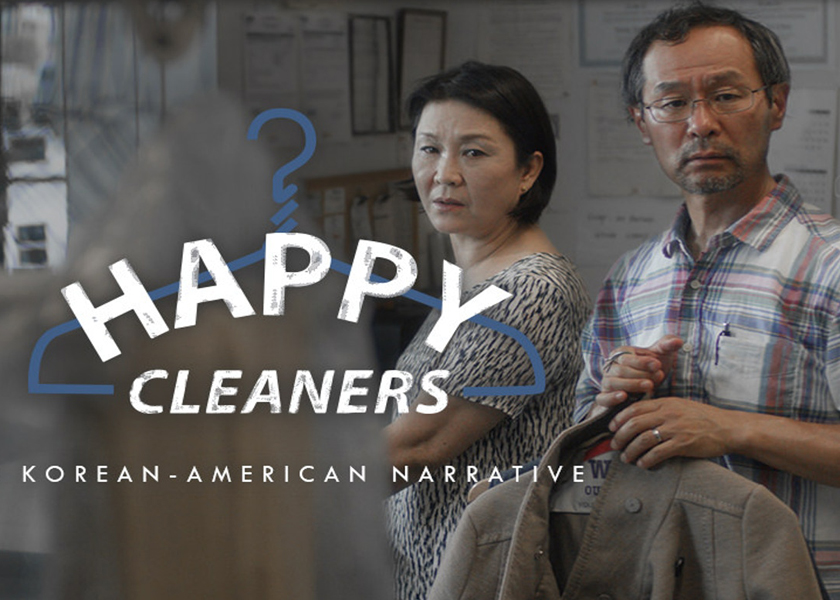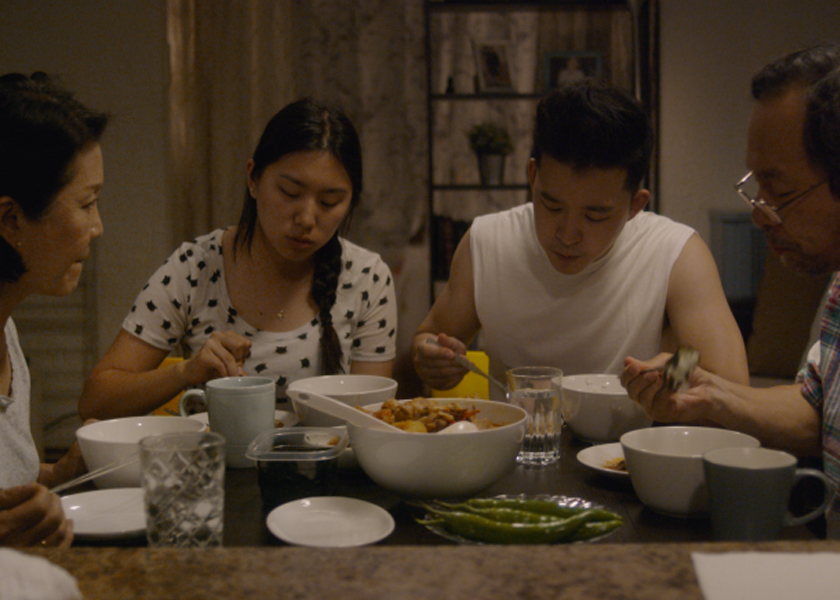Jesa shows mismatch of modern life and Korean gender roles | By Martha Vickery (Summer 2024)
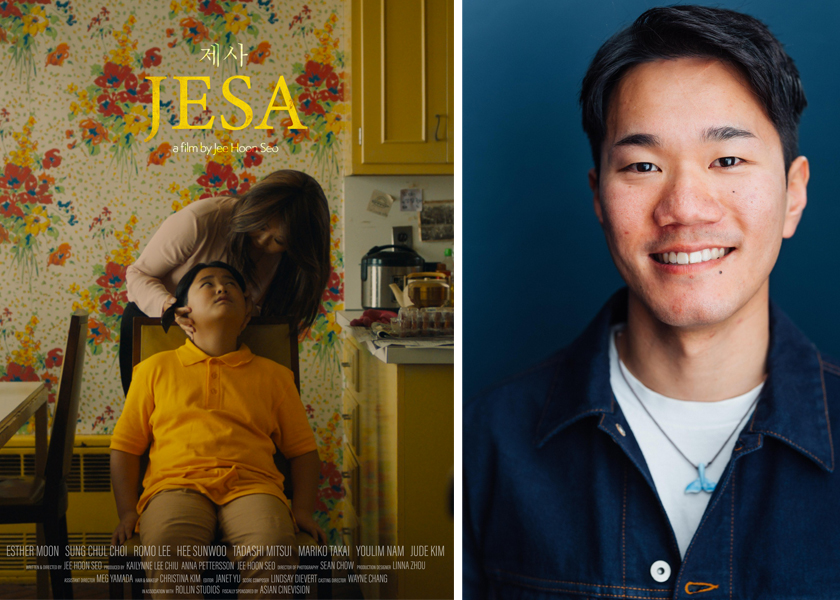
A new filmmaker who grew up in both Korean and Korean American culture is premiering a short film entitled Jesa, which hints darkly at the emotional complexities and perils of growing up in two cultures.
Jee Hoon Seo has a newly-minted film degree earned at New York University (NYU), and this fall he is jumping into a year fellowship in scriptwriting, and is also planning to enroll in graduate school at the American Film Institute in Los Angeles.
At the same time, his 14-minute Jesa, a thesis film for his NYU degree is being shopped to a variety of film festivals and other screenings. The film, which is mainly in Korean with subtitles, includes the well-known Korean American actor Esther Moon. Moon also played the role of Mrs. Oh in the award-winning Minari, a 2000 film about the Korean American immigrant experience (KQ review here). She was also in the 2022 Netflix drama Partner Track.
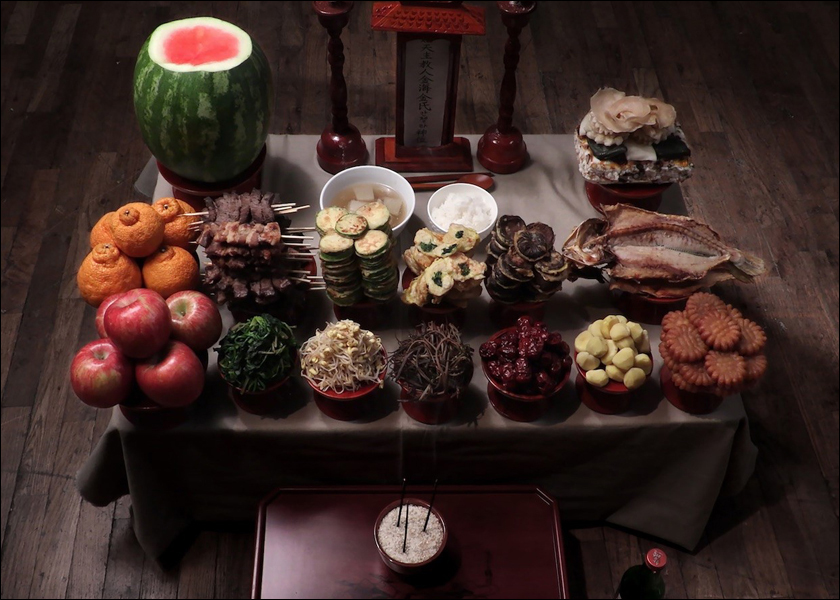
Seo describes his film Jesa was “heavily inspired by my own upbringing” and “the only film I wanted to make when I started at NYU film school.” In Korea, a jesa is a ceremony commemorating the anniversary of a loved one’s death, performed as part of a family get-together. The centerpiece of the ceremony is a table decorated with the loved one’s photo, along with an elaborate spread of the person’s favorite foods and drinks. After the ceremony, family members visit and eat some homemade food.
The ceremony is heavy with tradition and steeped in the Confucian value of respect for one’s elders. Preparing the ceremonial food is traditionally the purview of the women, particularly the daughter-in-law of the family, while the ceremony is performed by the men. Some aspects of the ceremony could be indecipherable from the perspective of Korean kids growing up in the U.S., and the film points out that culture gap.
In Jesa, the two brothers of the family, an older teenager and a pre-teen, growing up in the U.S., view the ceremony as outsiders. The other attendees are adults, either immigrants or visiting from Korea. The film is too brief to get into each of the characters’ stories, but the viewer gets to know the mom who is working non-stop in the kitchen, making the many dishes required for the ceremony. The viewer also gets to know the two sons; they check in with their mom, and help around the edges. She speaks Korean with the older son, and with the pre-teen younger son, she speaks in Korean and he answers back in English.
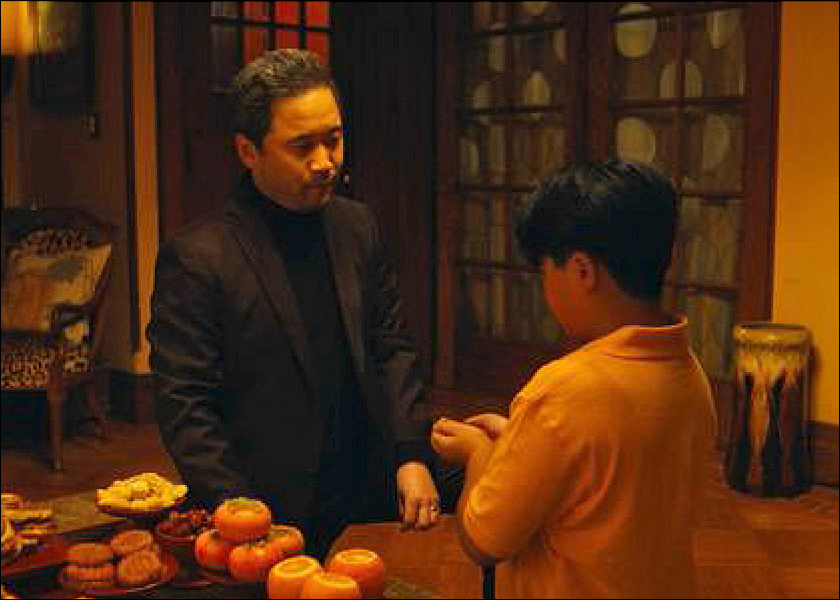
The audience also finds out that the father lives in Korea, and is supporting his wife and sons to live in the U.S. He is visiting his family in the U.S. for the jesa, and wants his sons to understand the importance of the day. The two sons are clearly allied with their mom, and the central tension in the film happens when the husband blames his wife for an infraction of the expected decorum. In the conflict, dangerous cracks appear in the thin veneer of Confucian tradition that the family has constructed for the occasion.
The film that almost wasn’t
The movie almost did not happen. Seo said he started at NYU as a film major, then had to take a hiatus to do his mandatory two-year military service in Korea. Upon returning from military service, “then COVID happened and I kind of put it aside,” he said. Having doubts even about pursuing a career in film, he still needed a thesis project after his first film, and became “desperate to pick a subject, and it made sense that this is the only one that I had in mind to do, and would regret not doing if I gave up film.”
Another complication was a serious injury he got whle playing soccer that had him laid up, anxious and uncertain. “It was a pretty bad injury where I couldn’t really go out of my room, and I was confined to a space and was going through a period where I didn’t know whether I could continue to direct.”
At that point, the filmmaker said, “I was like ‘I don’t even know if I can make a film, but if I’m going to do it one last time, this will be it.’ Because it was the film I always wanted to make, and maybe partly what got me into this in the first place.”
Seo said he does not identify with either the older brother or the younger in the film. Instead, he explained, he concentrated on the modern-day meaning of the ancient jesa ceremony. The film touches on ideas of family and growing up Korean American, as he thought about them as a child, and as he derived deeper meaning about them as an adult.
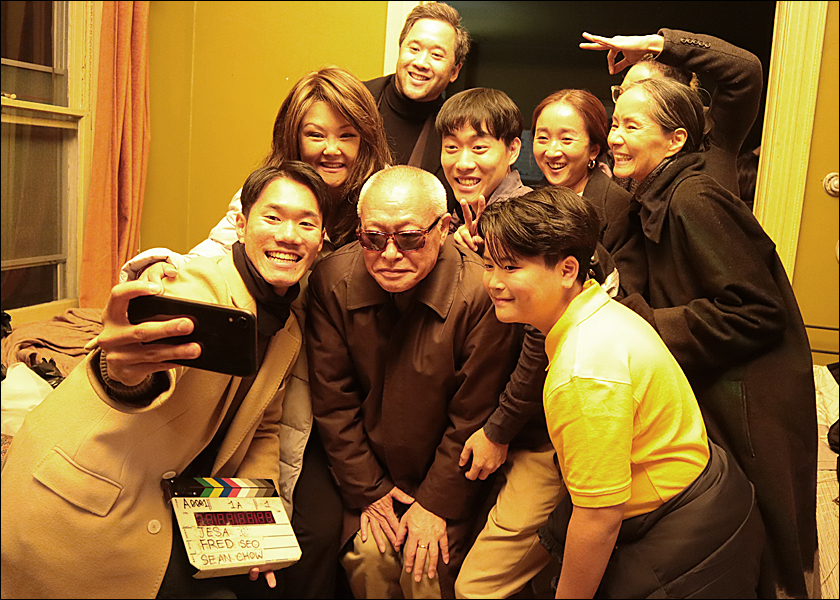
A knack for casting
Seo worked hard to find actors who were native Korean speakers for his film, paying attention to how well they portrayed emotion while speaking in Korean. He recruited Esther Moon, who plays the mother, after they met during his internship with Bound Entertainment. “I was surprised at how emotional her performance could be in Korean, which is rare in the States, and thought she would be ideal candidate.”
Seo tried to give each actor something to do, even if it was small or in the background. For example, the younger uncle (played by Jude Kim), gets a few laughs in his mini-scene with a bottle of soju that saves the day.
The older teen Tae Young (played by Sung Chul Choi) clashes with his father in defense of his mom after his dad shouts at her in front of the family. Her infraction of the rules is stumbling and spilling soup on the way to the table. The scene was understated at first, but was developed into a “screaming match” between Tae Young and the father, he said. There is an interesting use of sound when the younger brother Jin Young watches in shock as his father and brother shout at each other, and the scene fades out with a high-pitched tone that increases, in volume, as if the younger brother’s mind is blocking out the harsh words.
There was a screening at NYU this April, and Seo’s team was awarded the “Best Ensemble Acting” award, he added, “It helped validate for me that our performances were great.”
The roots of Jesa
Despite living in the U.S., Seo also spent time in Korea with his relatives, particularly his beloved grandparents. “And to this day, we practice the ceremony,” he said. But, for him, there was a disconnect. “I was growing up in America with my mom, who raised me kind of by herself. My dad was still in Korea, and she was taking care of me and my brother, she was going to school learning art therapy,” Seo explained. “She was very busy and was doing this all by herself. It made her a very powerful and independent woman, in my mind, but when it came to being in Korea and doing these ceremonies, she was very much subjected to this specific role.”
As he grew into adulthood, Seo said, his mother started to tell him more about what was happening behind the scenes during some of those key childhood years. He heard some explanations of things he always thought were ‘off,” he said, “Not just in the ceremony, but in her marriage. So this film a way to kind of express, finally, those kinds of thoughts and ideas that as a kid I had but wasn’t ready to put out there and express.”
In Jesa, Seo distills his emotions and revelations into a story that describes a mix of tension and unhappiness in the mother, and rage in the father which is disproportionate to the small mistake that happens during the ceremony. Both brothers’ views are also revealed. “There are two perspectives – innocence, and then adolescence where everything is very hot-headed and you want to fix things, but that can be a bit destructive,” he said.
The older son is frustrated and only partially understands about his mother’s oppressive marriage to their dad; the younger son perceives just a glimpse of his mother’s unhappiness, consoling her and offering to share his prized honey cookie with her instead of eating it by himself.
Viewpoint from two cultures
In straddling two cultures, Seo realizes how it changed him, and added complexity, as well as discernment, to how he views the world. The filmmaker shows the viewer the biased and incomplete view of both brothers, and plays with the idea of two unreliable narrations of reality as the camera calmly observes.
After the food is on the table and the ceremony begins, the camera shows the mother standing, unseen, at the back of the room. Seo said he remembers the women of his family sitting in the kitchen during the ceremony. “They had already done all the work, and the ceremony is just a short thing, maybe a half hour. If there were a lot of guests, it could be an hour of standing. So for them, it was finally their time to have a break,” he explained.
Even as a child, he remembers feeling “that it was so odd that they do all the work but at the end of the day, the men just sort of take the lead. They have a sense of pride and ownership over the ceremony, but all that work is not acknowledged.” In telling the story, he said, “it made sense to kind of isolate the lone mother figure to dramatize the separation. Everyone else is related by blood, except her. It’s shown, but no one really talks about it.”
Seo said he has “maybe more American ideals about an egalitarian society” than someone who was brought up only in Korea. He remembers admiring certain views of his American classmates “They seemed to all have this trait of being able to call out the B.S. and say ‘this is not OK – I don’t condone this.’”
In part, he reflected, the story of Jesa was catalyzed by his inability to express how he saw that such cultural practices were a mismatch with modern society. As an adult and a “fuller version of myself,” he said, “I can now say ‘I don’t think this was the best way to enforce tradition or culture.’ I cannot do anything about what happened, but I can still do my part to tell the story. It is partly my mom’s story, but I still had my views as a bystander, and that’s the only story I could tell.”
Creating a film about one’s own experience, even when only loosely based on one’s own family, is tricky. “I definitely had a lot of fear, and had to take precautions,” he said. However, he said, his family, particularly his grandfather, had always urged him to be honest. “I wanted to make something I could stand by and be honest about. And this ceremony and my family – they are still people I love and a culture and history that I really value. But at the same time, I could notice the flaws, and I’m sure other people could notice them too.”
Microcosm of a changing Korea
During his childhood in the mid-2000s, Seo believes he was living through a time in Korea when the traditional strict rules of gender roles, at least certain ones, still applied. Although he did not know it at the time, things were changing in Korea, and his family, with some in the U.S. and some in Korea, were feeling it acutely.
These days, Seo observed, “Korea is in a very transitional phase. Younger people have a lot of vocal power, and really can just kind of stick it to the older generation and say ‘I don’t want to get married, I don’t want to have kids, and I want a career. I don’t want to have to live with another family.’”
There is also a demographic of what he calls “traditionalist families”; his father’s side is typical of this. Despite his grandfather’s love and high regard for his brother’s wife, “there is an expectation” by his grandfather (and other Korean elders) that women will get married around age 30 or younger “and then they are expected to bear kids, and my grandfather wants grandsons and great-grandsons.”
Seo has reflected upon some things his mother shared after she saw the film. “One was that when she married – she was 24, and I’m now 25 – her parents apparently literally told her ‘you are marrying off to another family, and you are going to spend the rest of your life with them, and you are going to be their daughter-in-law, and you are going to perform that role, and if it doesn’t work out, you cannot come back, and you have to ride it out.’”
Being told that there was no support system for her was traumatic, Seo said. “It may not have influenced her decision to stay [married) because… like 80 percent of the childrearing was her responsibility. She said it definitely would have been less stressful and traumatic if her family had told her they were willing to take her back. But she didn’t have that option.”
Having such deep conversations with his mother informed his scriptwriting for Jesa, which is set in the mid-2000s. “The more I think about it and look back, I can see that it was a totally different time, when women had different responsibilities to follow that were not dependent on how they felt or what they wanted.”
As a filmmaker and a storyteller, Seo continually asked himself if he was presenting it “in an authentic manner, without trying to enforce a view or a lesson.” Too little information, and the audience will not perceive the message; too much and it would become didactic. Seo believes he hit the balance.
There are moments where the film is depicting the best parts of a family gathering – the food and the laughs, he said. “But there is a sense that we know something is not quite right.”
Since the mid-2000s, Korean culture has changed, Seo said. The jesa ceremony has become less common. It is also less common for the daughter-in-law to be solely responsible for the preparation. “People are doing it differently because they don’t see the necessity of someone going through all that work …or now, there are delivery services where you can just have the food delivered [for the ceremony],” he said.
Jesa will be screened at two New York film festivals in August – the Asian American International Film Festival and the Greenpoint Film Festival. As a short film, it can compete with other short films, but is not the type of film that typically brings in revenue. Sometimes, a short film can be a “proof of concept for a feature,” he said, but he does not plan to make Jesa into a feature-length film. However, the film will be useful as a kind of “calling card” about him when investors or anyone else needs to see a sample of his work. Right now, he said, it will not be available for viewing outside film festivals, but he wants it to be on some kind of platform in the future.
During the production of Jesa, he had a chance to apply for a fellowship that required a TV pilot script for entry. He had no script that fit the bill, and he had a three-week deadline. “I thought that I had always wanted to write about my soccer team – we had a Korean soccer team at NYU, and we had won three championships back-to-back. And there was always a little bit of drama.” He wrote a script and sent it off on line. “We went ahead to shoot the [Jesa] film, and months later, I found out that I got one of the fellowships I applied for.”
Film fellowship and grad school
Thesis films in film school tend to be self-reflective, with coming-of-age themes, Seo said. The new film “will be a rom-com, which is a very different genre and a very different feel … I like romance, and I like soccer, so the next projects will continue to inherit my Korean and American views and experiences, but I feel like family drama is not the only medium or genre I’m interested in.”
The fellowship, from the Hollywood Radio Television Society (HRTS), will also include helpful support in the form of script development and with consultations about how to pitch the film to investors. The HRTS also holds networking and educational events of interest to filmmakers.
At the same time, he will apply for a graduate program from the American Film Institute in Los Angeles, where he will continue learning, directing and writing for another two years.
After getting audience feedback from screenings, Seo said he was pleased that audience members liked the theme of coming-of-age and family interaction. “I took that as high praise,” he said. Seo is persuaded that in writing about his own Korean family, the most important information the film imparted was not related to Korean culture as much as it was to universal experiences everyone has with their families.
Other friends and former classmates who came to the screenings knew little or nothing about Korean culture, but that didn’t matter, Seo said. “Some of my friends from Boston, and a former roommate from rural Connecticut came to see it,” he recalled. “and my roommate said ‘it reminds me of some conversations I’ve had with my mom.’”
Seo said he is not committed to making Korean family dramas, but he is driven toward the authenticity of writing about his own truths. “I do things based on my experiences, because I feel things and I want to express them and go on a journey to figure out why it is bothering me or interesting me,” he said. “I think [Jesa} was able to give me a lot of closure in a lot of ways. And now, I’m ready to move on to another subject.”
A trailer for Jesa is on the Asian American International Film Festival website, at this link.

